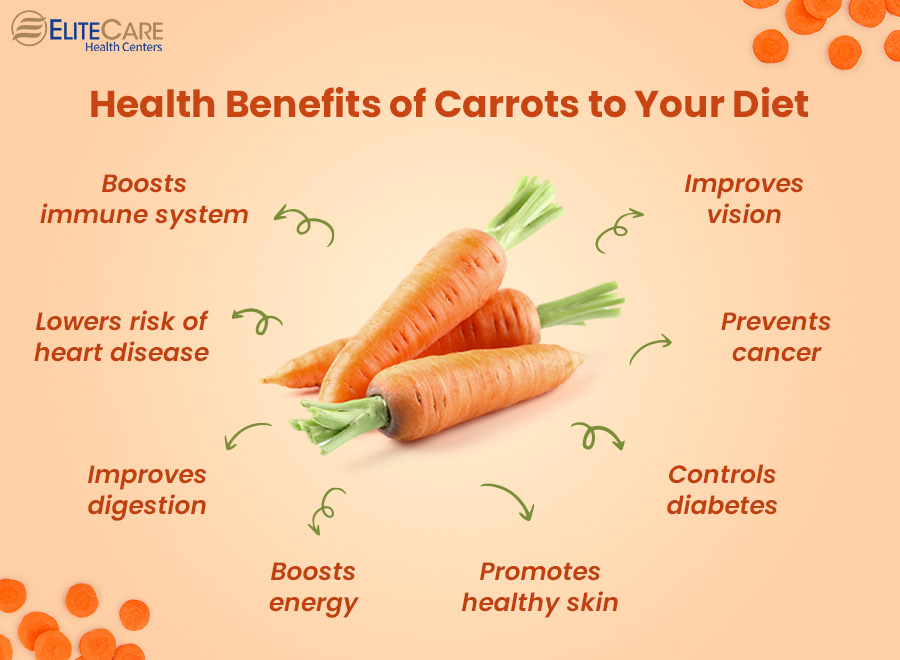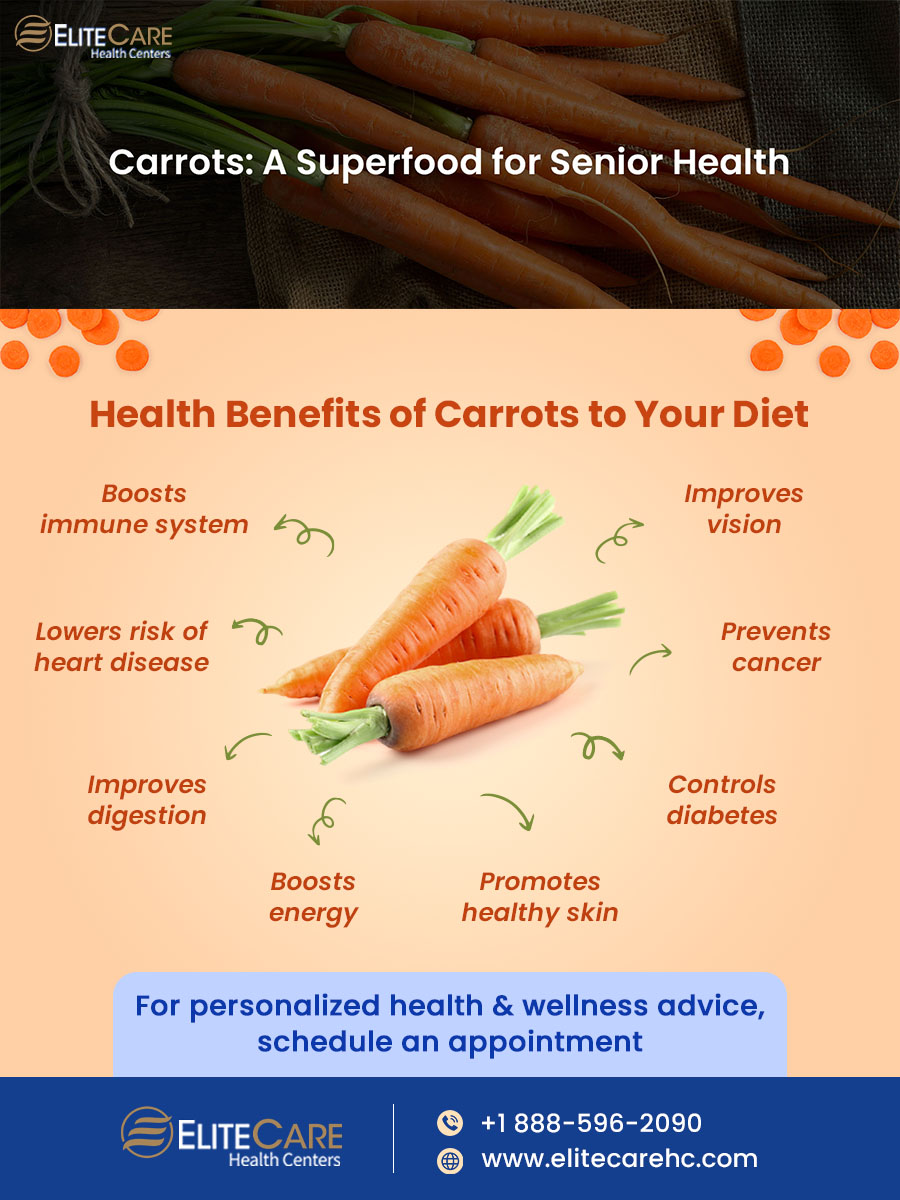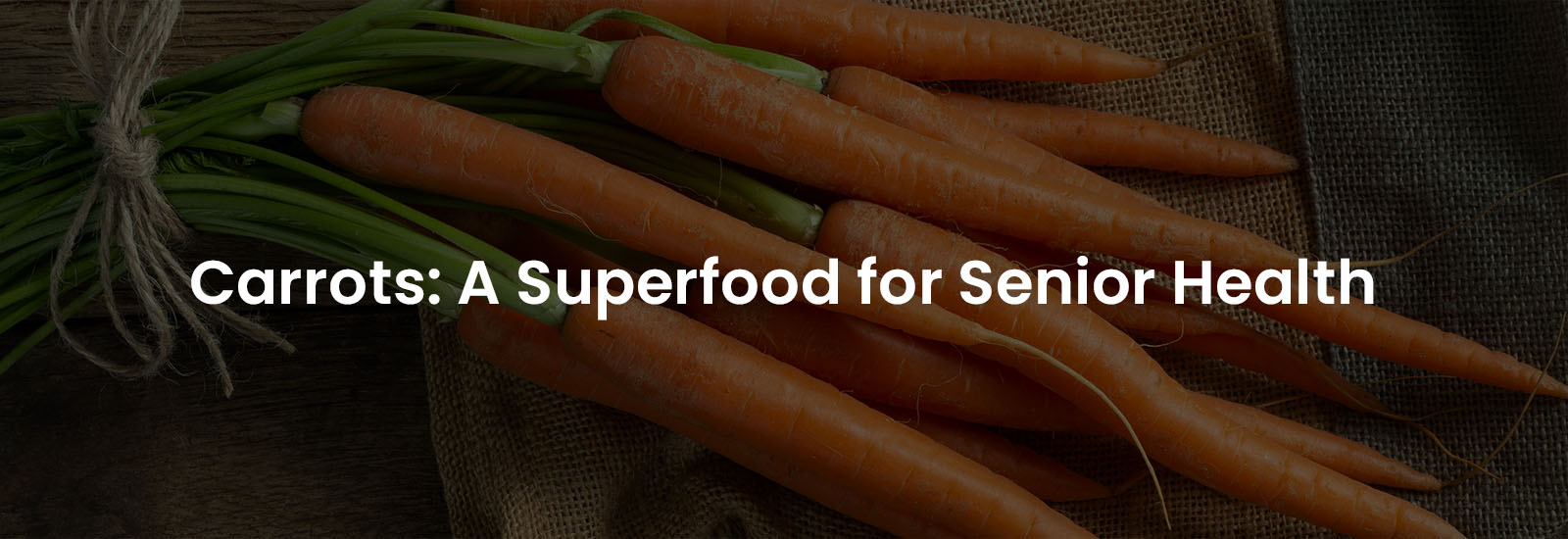
With age, the body’s ability to utilize and absorb nutrients decreases, making it even more important for seniors to consume nutrient-dense foods as part of their daily diet. A balanced diet rich in essential vitamins, minerals and nutrients helps maintain good health and prevent chronic diseases. One vegetable that should be overlooked is carrots. These colorful and vibrant root vegetables are not just delicious but also offer a range of health benefits that are particularly important for seniors. So, let’s discuss carrots’ health benefits and why they should be a staple in seniors’ diets.
Health Benefits of Adding Carrots to Your Diet

1. Improves vision
We’ve all heard the age-old saying that carrots are good for our eyesight, and it turns out that there’s some truth to this claim! Carrots are a rich source of beta-carotene, which is converted to vitamin A in the body. Vitamin A is essential for maintaining good vision, and a deficiency in this nutrient can lead to a range of eye-related problems.
The other important nutrients present in carrots are lutein and zeaxanthin. These nutrients have been shown to play a crucial role in maintaining good vision and reducing the risk of age-related macular degeneration and cataracts. Seniors can benefit from these nutrients by eating carrots regularly and keeping their eyes healthy.
2. Boosts the immune system
The immune system gradually weakens with age, making seniors more susceptible to infections and illnesses. Carrots are a great source of key nutrients essential for immune system function, including vitamin C and beta-carotene. Vitamin C is a powerful antioxidant that helps protect the body against harmful pathogens. At the same time, beta-carotene has been shown to enhance immune cell function and reduce the risk of infections.
Studies have also shown that vitamin A, converted from beta-carotene in the body, plays a critical role in developing immune function. But the health benefits of carrots don’t stop there. In addition to immune-boosting properties, carrots are a great source of other beneficial nutrients such as vitamins E, K, and potassium, all of which contribute to overall health and well-being.
By adopting a diet rich in these nutrients, along with healthy habits such as regular exercise and getting enough sleep, seniors can maintain a strong and healthy immune system. With the help of a primary care physician, seniors can figure out what kind of diet is best for them and how to incorporate healthy foods like carrots.
3. Lowers the risk of heart disease
According to American Heart Association, 70% of people over 70 develop cardiovascular diseases.
Carrots contain various heart-healthy nutrients, including fiber, potassium, and antioxidants such as beta-carotene and vitamin C. These nutrients work together to help reduce inflammation in the body and lower LDL (bad) cholesterol levels, both of which are risk factors for heart disease. The potassium present in carrots also helps to regulate blood pressure. The high fiber content in carrots binds to cholesterol in the digestive tract, preventing it from being absorbed into the bloodstream.
If you’re already suffering from heart disease or have concerns about heart health, it’s best to visit our health and wellness center. Our primary care physician can provide personalized advice and treatment to help manage the condition and improve overall health.
4. Reduces the risk of cancer
Antioxidants found in carrots can reduce the risk of several cancers, including lung, colorectal, prostate, and leukemia. Beta-carotene, vitamin C, and fiber are among the key anti-cancer nutrients found in carrots. Beta-carotene has been shown to lower the risk of certain types of cancer, including lung and colon cancer. Meanwhile, vitamin C, a potent antioxidant, helps neutralize free radicals in the body that can cause DNA damage and promote cancer development.
5. Improves digestion
Carrots contain several nutrients that promote good digestion. The high fiber content in carrots can help promote regular bowel movements and prevent constipation, a common issue among seniors. Additionally, carrots contain a specific type of fiber known as insoluble fiber, which promotes the growth of healthy gut bacteria that aid in breaking down food and absorbing nutrients. Vitamin A, found in abundance in carrots, also helps protect the lining of the digestive tract from inflammation and damage, potentially preventing digestive issues like ulcers and inflammatory bowel disease.
6. Reduces the risk of diabetes
Incorporating carrots into a senior’s daily diet can help reduce the risk of developing type 2 diabetes. Carrots are a rich source of nutrients, including vitamins, minerals, and fiber, essential for regulating blood sugar levels. Fiber slows down the absorption of sugar into the bloodstream, preventing spikes in blood sugar levels that can lead to insulin resistance and diabetes. Furthermore, low blood levels of vitamin A have been found in individuals with diabetes. Vitamin A plays a crucial role in fighting oxidative stress and improving insulin secretion, thus reducing the risk of insulin resistance. Additionally, the antioxidants and carotenoids in carrots protect pancreatic cells from damage, reducing the risk of developing diabetes.
7. Increases energy levels
Carrots provide a natural energy boost, making them one of the essential vegetables to add to seniors’ diets. As with age, seniors do face low levels of energy. Carrots are rich in carbohydrates, fiber, and vitamins B6 and C, which all increase energy levels. Carbohydrates provide a quick energy source, while fiber helps regulate blood sugar levels for sustained energy throughout the day. Vitamins B6 and C are involved in energy metabolism and neurotransmitter production. Antioxidants found in carrots help reduce inflammation in the body, which can contribute to fatigue and low energy levels.
8. Promotes healthy skin
Several skin- benefiting nutrients are present in carrots, including beta-carotene and vitamin C. Beta-carotene is a powerful antioxidant that gives carrots their vibrant orange color. When converted into vitamin A, it helps to maintain healthy skin by regulating skin cell growth and repair. Vitamin C in carrots also promotes collagen production and protects the skin from damage caused by free radicals. In contrast, the high-water content of carrots keeps the skin hydrated and prevents dryness. Carrots also contain other skin benefitting nutrients, such as potassium and lutein.
Takeaway
There are numerous health benefits of carrots. Incorporating more of them into their diet is a simple and effective way for seniors to reap the benefits of this nutrient-rich vegetable. Seniors can add carrots to their diet in many ways, including them in salads, soups, or stews or as a healthy snack with hummus or other dips. Carrots can also be roasted, steamed, or boiled as a side dish or mixed into casseroles or stir-fries.
For personalized health and wellness advice and to know more about senior care services at our health and wellness center, visit Elite Care Health Centers in Florida.






